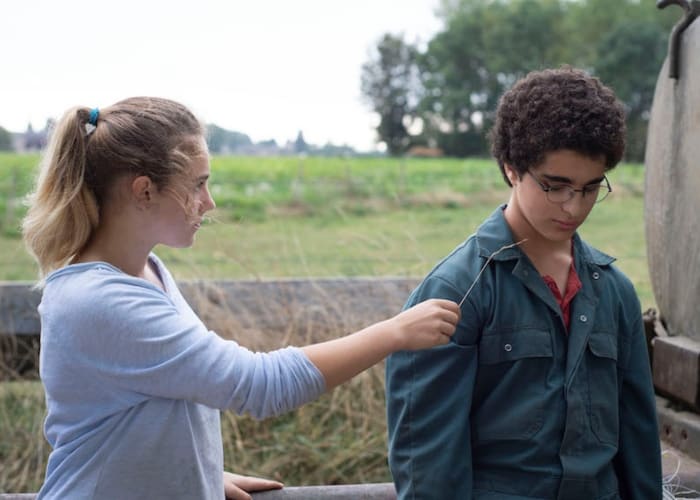
The Dardenne brothers Jean-Pierre and Luc are known for their emotional slice-of-Belgian-life dramas, but none of their work can prepare you for gut-punch that is Young Ahmed. Their latest film tells a tough story that many Americans have probably never allowed themselves to consider. A teenage Muslim in Belgium becomes enthralled with extremists and plots to kill his schoolteacher to impress his imam, who has been radicalizing him in secret. Seeing the dangerous ideology in an otherwise innocent child is a brilliant test of the audience’s empathy.
Ahmed (played by first-time actor Idir Ben Addi), resembles any harmless, awkward 13-year-old boy. He walks with his shoulders hunched and arms straight at his sides, uncomfortable in his body. He still wears thin round eyeglasses that make his dark eyes even larger than they already are. When in school, he doesn’t want to learn algebra and has other things on his mind. Yet, when we find out that what he’d rather be doing is reading the Quran and praying to a jihadist, his innocence fades away. His imam, Youssouf (Othmane Moumen), plants in Ahmed’s mind an obsession with purity based on an extreme interpretation of the Quran. He instructs him not to shake hands with his female teacher Ines (Myriem Akheddiou) in school and even convinces him his own mother is despicable. Desperate to be the next jihadist martyr and impress Youssouf, Ahmed tries to kill his teacher, who he has been made to believe is a heretic for teaching Arabic outside the Quran.
The film doesn’t shy away from showing the audience that Ahmed is perfectly capable of violence. He practices running with a knife in his sock, attaching his glasses to his ears with rubber bands so he can still see during the attack. Ahmed is getting closer to adulthood as he’s able to act on something he believes in, yet without truly understanding what it means. His capability of violence without the mental maturity to know the consequences makes watching him work himself up to attacking his teacher an agonizing experience.
He’s sent to juvenile detention for reform, and after just two months claims that he has changed and begins to convince his caseworker and his psychologist that he’s ready to ask for forgiveness. However earnest Ahmed may act, he is a character that is hard to trust. In solitude, he proves to have unwavering obedience to what he has been taught to believe. He maintains the facade of betterment while working on a farm he is sent to but cannot let go of his obsession with purity. Just when Ahmed seems to have true breakthroughs, real desires that he has been told are forbidden, he retreats back to the rigid lines that have been drawn for him by his imam. Farmhand’s daughter Louise (Victoria Bluck) test Ahmed’s beliefs in ways he thought he was beyond in some of the best scenes of the film, but they are not enough to change him.
While some might find Young Ahmed to be lacking the emotional complexity of other Dardenne films, it touches on a story that makes the audience feel something more complicated than most are giving credit for. The audience is witnessing a young man taught that violence is the answer to his uncertainty of the world, something that we usually only see the aftermath of. There are not many films that show the struggle of a young man such as Ahmed that aren’t glorifying his rebellion or isolation from other people. Throughout the film, we hope that somewhere inside there is goodness, yet we’re terrified to see that proven for fear we’re wrong.
Young Ahmed is a film about teenage rebellion, yet with higher stakes and a more complicated subject. Ahmed rebels against his mother, his teachers, and hold similar angst to any other teenager. In the latter half of the film, he is shown in scenes not far off from those of Antione Doinel running away from a youth detention center, away from the unsympathetic adults he encounters throughout The 400 Blows. Yet, the audience cannot feel the same relief for Ahmed when he is on his own. We know what danger he is capable of and what he continues to strive for, and we can only watch and wait to find out if Ahmed will finish the crime he started.
The Dardenne brothers provide a swift ending to Ahmed’s story, but it is not one without catharsis and resolution. Ahmed’s ending and capability for redemption are uncertain up until the last frame, and its enough to leave you breathless. Young Ahmed is a rare expectation-defying film that tries to convince you there is no hope for Ahmed, and yet you can’t help but hold onto hope that Ahmed has it in him to change for good. Watching the film is something of a torment, but it’s one worth experiencing.
Related Topics: Film Festivals, NYFF, Young Ahmed

